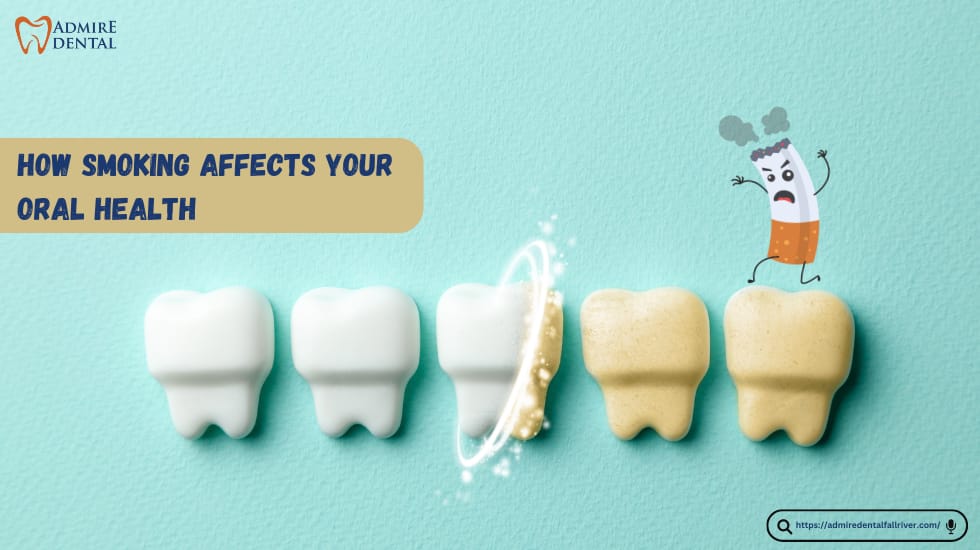Smoking cigarettes is well-known as a cause of a variety of health problems that range from lung cancer to heart disease. Yet, many do not recognize the significant effects it has in the health of their mouths. Your mouth is the primary gateway into your entire body and smoking tobacco can cause harm to it in numerous ways. In this blog, we will discuss the many ways that smoking affects your oral health and how stopping smoking can help improve your dental health, and offer solutions to some of the most frequently asked question about how smoking affects your health.
The Impact of Smoking on Oral Hygiene
Staining of Teeth and Discoloration
The most obvious results of smoking are the stains on your teeth. Nicotine and tar that are in tobacco can make teeth become yellow and, after long-term use, they can turn even brown. This coloration isn’t only aesthetically unpleasing, but also causes a loss of confidence with your teeth.
Bad Breath
Smoking can cause bad breath, which is commonly referred to as smoky breath. The nicotine in tobacco remains within the mouth which leads to an odor which is hard to eliminate, even with regularly scheduled brushing or mouthwash which will further reduce aspects of how smoking affects your oral health
Buildup of Plaque and Tartar
Smoking causes the production of tartar and plaque within the mouth. The plaque is an incredibly sticky layer of bacteria that builds up on teeth. If not cleaned out, it can harden into tartar. This can cause tooth decay and gum disease which is one of the major factors about smoking affects your oral health.
Smoking and Gum Disease – Smoking affects your oral health
Increased Risk of Gum Infections
Smoking can weaken your immune system which makes it more difficult to fight diseases, such as those found in the gums. This increases the likelihood for developing gum diseases which could lead to tooth loss if it is not treated.
Symptoms of Gum Disease
Gum disease symptoms are one of the major factors of how smoking affects your health is that there are common are swelling, red gums, bleeding and swelling. Smokers might not be able to notice these signs as rapidly as non-smokers due to smoking. Smoking can hide the symptoms, allowing the condition to go without being noticed.
Difficulty in Treatment
Treatment of gum disease for smokers can be a challenge. Smoking decreases the effectiveness of treatments for gum disease and makes it more difficult to get the best results when getting info about smoking affects your oral health and what are its other factors which play a crucial role in it.
Smoking and Oral Cancer – Smoking affects your oral health
Increased Risk of Oral Cancer
Smoking cigarettes is the leading source of cancer in the mouth. The harmful substances in tobacco cause mutations to the oral cells which can lead to tumors. People who smoke are 6 times more likely to develop oral cancer than non-smokers.
Symptoms of Oral Cancer
The signs of oral cancer are the presence of persistent sores, lumps or mouth ulcers that are not healing or heal, as well as difficulty swallowing and mysterious bleeding. The early detection of oral cancer is essential for smokers, and they should be aware of regular dental examinations.
The Importance of Early Detection
Oral cancer is extremely treatable when detected early. Regular visits to the dentist and self-examinations are a great way to aid in early detection and increase the likelihood of success in treatment.
Gum Health and Whitening
Smoking not only affects the color of your teeth but also your gum health. Poor gum health can lead to complications during teeth whitening treatments, as irritated or receding gums might increase sensitivity and discomfort during the process.
Smoking and Dental Procedures
Delayed Healing After Dental Surgery
Smoking may delay healing following dental procedures, such as extractions implant, gum surgery. Smoking can enlarge blood vessels, which reduces the flow of blood to heal the region.
Increased Risk of Infection
The decreased immune response in smokers can also increase the chance of developing an infection following dental procedures. This can result in problems and longer time to heal.
Complications that can occur with Dental Implants
Smokers are at a greater risk of failing implants due to inadequate healing and a higher risk of developing infections. Stopping smoking may increase the chance of success for dental implants as well as other procedures.
Benefits of Quitting Smoking for Oral Health
Improved Oral Hygiene
Smoking cessation will enhance the process of oral health and cleanliness. The quality of your breath will improve and the probability to have plaque stains and staining will also be provided, thus, having healthier gums and teeth.
Reduced Risk of Gum Disease and Oral Cancer
If you quit smoking, you decrease the chance of developing oral cancer and gum disease. Your gums will get healthier as will your body’s immune system, which is stronger to fight diseases.
Enhanced Healing and Success in Dental Treatments
In the absence of the negative effects of smoking your body will heal more effectively following dental procedures, leading to better results and fewer complications in how smoking affects your oral health.
Conclusion
Effects to the mouth that are caused by smoking tobacco range from minor such as stink breath, reddened gums, and stain teeth, to dangerous ones like gum cancer and oral disease. On the brighter side, it is possible to quit smoking cigarettes to enhance oral health and reduce the probability of smoking cigarettes. It goes a long way to show that people who attempt to quit smoking cigarettes and make it a habit to have dental check ups enjoy a healthier and gorgeous smile.
FAQs
Q1: When after quitting smoking do I notice changes in my health and appearance?
A1 It is possible to start seeing improvement in the health of your mouth after just a few weeks after quitting smoking. The breath will be better as time passes, and, with time, the chance of suffering from gum disease or oral cancer will drop dramatically.
Q2: Does smoking cause irreparable damage to my teeth or gums?
A2 It is true that smoking cigarettes may cause irreparable harm which can lead to tooth loss as well as gum disease that is severe. But, stopping smoking will reduce the risk of further damage and enhance the condition of your teeth.
Q3: Is electronic cigarettes more healthy for your oral health when in comparison to conventional cigarettes?
A3 Thus, despite the fact that e-cigarettes produce fewer hazardous substances than ordinary cigarettes, e-cigarettes are unsafe. They still may cause inflammation, dryness of the oral cavity and oral diseases.
Q4: How do I keep my oral health in good shape when I smoke?
A4 Smokers, maintaining good oral hygiene is vital. Cleanse and floss frequently Use mouthwash, brush your teeth regularly, and see your dentist on a regular basis for routine exams. Try quitting smoking to get the most optimal oral health results.
Q5 What resources are there to assist me in quitting smoking?
A5 Numerous resources are available to assist you in quitting smoking cigarettes, such as nicotine replacement therapy support groups, counseling and programs to quit smoking. Consult your physician to get a personalized recommendation.

